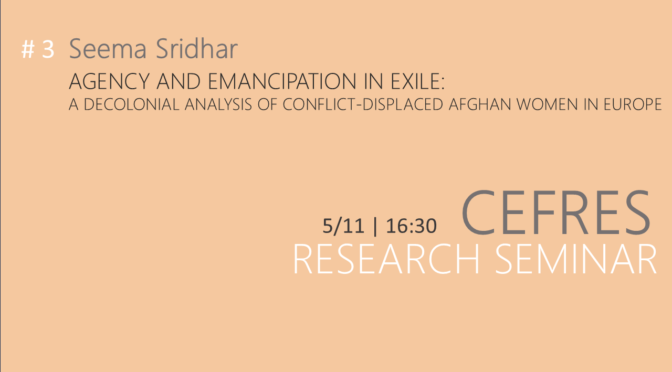Agency and Emancipation in Exile: A Decolonial Analysis of Conflict- Displaced Afghan Women in Europe
3rd session of CEFRES in-house seminar
Through the presentation of works in progress, CEFRES’s Seminar aims at raising and discussing issues about methods, approaches or concepts, in a multidisciplinary spirit, allowing everyone to confront her or his own perspectives with the research presented.
Location: CEFRES Library
Date: Tuesday, 5 Novembre, 2024 at 4:30 p.m.
Language: English
Contact / To register: cefres[@]cefres.cz
Seema Sridhar (CEFRES / CEU)
Chair: Zuzana UHDE (Institute of Sociology, Czech Academy of Sciences)
Abstract
My project seeks to bring to the fore, the lived experiences of conflict, international intervention, and displacement of women from present-day Afghanistan. The focus would be on the displaced/exiled women living in select cities in Europe, who were exiled over the past decade when the Taliban forces began regrouping and attacking groups who were perceived by them as pro-Western intervention. I want to explore the idea of emancipation through narratives of embodied and emplaced experiences of oppression and resistance of exiled women, transcending geographical boundaries, and temporal delineations of ‘conflict’ and ‘post-conflict’ scenarios.
The aim is to explore the potential for emancipatory or transformative processes to stem from within communities, and juxtapose them with externally imposed inclusivity initiatives that may not be sustainable. By drawing upon the linkages from the host country to the home country, connecting the dots between their past experiences during international intervention in Afghanistan and how this could be reflected in their capacities to cope with living in exile — the circle of participation and agency over a continuum of violence shall be traced in my research. This entails a nuanced analysis of how exiled women are striving for building sustainable peace through various initiatives by organizing themselves, raising awareness in their host countries, showing solidarity, and aiding their kin and community back in their places of origin, and how these initiatives and their capacities and motivations to envision and implement the same are shaped by their past experiences. The concerted effort by women in exile to be seen and heard, to be taken seriously and to foreground their efforts outside the margins, the various ways and means in everyday lives that this can be accomplished, has invaluable potential in contributing to alternate ways of generating knowledge, and I draw upon literature from feminist peace research to locate my work and further my research in this direction.
The purpose of this broad interconnected examination of interspersed phases, by analyzing women’s participation and agency, is to inform how every process has repercussions that reverberate through time and geographical space. These experiences are not static and move along with the bodies that encapsulate them. An analysis of peacebuilding and displacement beyond temporal and spatial dimensions of the site and period of conflict is essential to inform our understanding of the fluidity of these processes and phases, and I shall draw upon scholarship from political geography to aid me in this study.
My presentation at the CEFRES seminar will be divided into three broad sections. First, a conceptual outline of peace and conflict studies, the local turn and the spatial turn, and situating my project within feminist peace research literature. Second, there would be an introduction to the empirical context of Afghanistan, the ethnic composition, the situation of women and minorities. Third, the methodological approach, field work, potential collaborative efforts will be discussed.
See the complete program of 2024–2025 seminar here.

